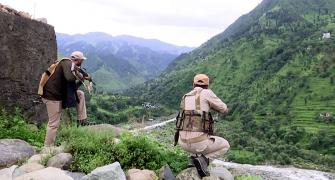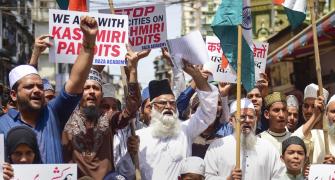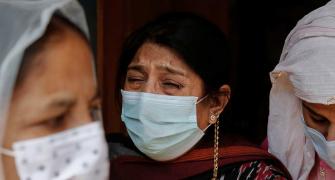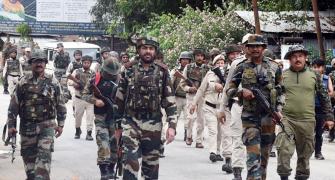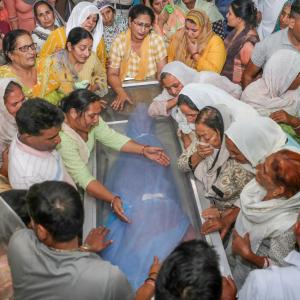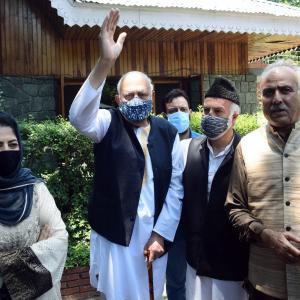'There is a sustainable level of residual terrorism that will be difficult to handle as long as Pakistani support and safe havens are available.'

On Tuesday, August 16, 2022, rerrorists shot dead a Kashmiri Pandit and injured his cousin at an apple orchard in south Kashmir's Shopian district.
Dr Ajai Sahni, executive director, Institute of Conflict Management, has been documenting terrorist activity across the sub-continent for the last three decades.
"If the current pattern of polarising politics, as well as the disruption of normal political institutions and processes in the UT persist, a trickle of extremist recruits will continue to flow into the terrorist ranks," Dr Sahni tells Rediff.com Senior Contributor Rashme Sehgal.
The concluding segment of a three-part interview:
- Part 1: 'Terrorism in J-K is an Islamist extremist venture'
- Part 2: 'Peace has not been 'miraculously restored' in Kashmir'
From the targeted killings this year, the majority belonged to the majority Kashmiri Muslim community with many of them being policemen and panchayat leaders who were seen to be working for the state administration and are therefore being targeted.
The terrorists had all the details of their location.
The terrorists and their State sponsors in Pakistan have significant surviving networks of sympathisers and informants in the general population, and there would be little difficulty in identifying and locating Hindus, including Kashmiri Pandits, for selective targeting.
Moreover, it cannot be the case that the Kashmiri Pandits are going to live secret lives, completely sealed off from the general population.
They will be working in public offices and moving about in public spaces, even if their accommodation is in secure camps.
Even if they are provided substantial security cover, it cannot be fail-safe.
The problem is even more obvious with regard to the non-Muslim labour employed in the UT, who have little or no protection.
Even among Muslims, policemen and their families, government employees, panchayat members and politicians have been targeted.
Clearly, the underground intelligence network is quite effective.
The redrawn political constituencies by the J&K Delimitation Commission has been seen to favour the Jammu region which has 44 per cent of the population but has got 48 per cent of the seats.
This fear of demographic change has further served to strengthen the anti-government sentiment in the Kashmir Valley.
There is little evidence of any significant demographic change in the UT, and no visible influx of outsiders since the revocation of Article 370.
However, there is some indication of the manipulation of the delimitation process to give the Jammu region and Hindu majority constituencies greater representation on the basis of criteria that are, prima facie, inconsistent, and processes that have been less than transparent.
I quote a security analyst who has noted that even though 34.1 per cent of Jammu's population is Muslim, the region's Muslim-majority seats have fallen from 13, to 10.
Kashmir has one seat more over its earlier representation while Jammu has six.
To many in Kashmir, this is evidence the BJP is undermining democracy, in a bid to institutionalise Hindu-majoritarian rule.
Certainly, this has not been missed by the majority in the Valley, and it will contribute to greater resentment and alienation.
Some security experts have warned that terrorism has entered its most dangerous phase especially since the present killers are home grown and difficult to identify? How strong is the Pakistani hand in this?
Most such analyses are unfettered by facts or data.
There is certainly an increase in 'home grown' terrorism, as opposed to the activities of foreign (Pakistani) fighters and groups, but far from indicating a 'most dangerous phase', this is evidence of the pressure on Pakistan not to be seen to be exporting terrorism into India, of the greater effectiveness of India's security forces in interdicting infiltration, of the greater security force dominance over the ground in J&K, and of the progressive erosion of terrorist capacities.
There has always been a significant number of 'home grown' terrorists in J&K, and there are phases when they have dominated terrorist activities at much higher levels.
The present phase reflects an extremely inefficient and ineffective pattern of terrorism, where poorly trained youngsters are being sent out to execute single targeted killings.
Most of these youngsters are apprehended or killed, soon after a single such 'operation.'
The supply line of volunteers for these operations is unlikely to be very large, given the risks and almost immediate consequences.
Data on overall fatalities in the state clearly indicates that the effectiveness and lethality of terrorist operations is declining, even as fatalities among terrorists constitute the overwhelming proportion of total fatalities in the UT, month after month.
If some recruits continue to flow, this is at least in part the result of the hysterical assessments that are currently doing the rounds, as these make these unfortunate youngsters believe that they are being far more effective than they actually are.
Other experts have warned of a sleeper cell located in Srinagar which security forces have not been able to track down.
Of course, there will be some sleeper cells, in Srinagar and elsewhere as well.
But the fact that they are not being activated even though the attrition rate of existing terrorist groups and their leaders is terminally high, suggest that their capacities to act with sufficient impact to alter the trajectory of terrorism in J&K are extremely limited.
Security forces are not omniscient. However, as intelligence is uncovered after each operation and arrest, some of these elements are uncovered.
The increasing focus on over-ground workers will also provide improved information flows regarding these cells.
Not everything will be solved at a stroke, but the security forces are certainly consolidating their dominance over time.
The Valley has faced terrorism for three decades now. Do you see any end to this in the near future?
There is a sustainable level of residual terrorism that will be difficult to handle as long as Pakistani support and safe havens are available.
Moreover, if the current pattern of polarising politics, as well as the disruption of normal political institutions and processes in the UT persist, a trickle of extremist recruits will continue to flow into the terrorist ranks.
Unless there is a focused and massive effort to establish credibility and trust in the population of the Valley, terrorism will remain a chronic, albeit low level, problem.
I certainly see no resolution as long as the state itself continues to fan the flames with the polarising politics of the ruling party.
Why has the government not yet drawn out a road map for the restoration of the democratic process in the Valley and for the holding of elections?
Its inability to do so has only served to further alienate the Kashmiri youth.
It is difficult to speculate on the government's motives and intentions.
There have been repeated assurances that elections will be held soon, even as there has been a great deal of puppeteering to create 'political alternatives' in the Valley.
These latter efforts have failed comprehensively, and it is clear that, when the electoral processes are restored, it is the traditional political parties of the region that will come to occupy the political space once again.
This is, perhaps, unacceptable to the present, ideologically entrenched, regime.
As for alienating the youth in the Valley, that is not something that the majoritarian politics of the BJP puts any great value to.
They believe that this is a segment that can easily be suppressed by the security forces.
The relatively low-grade violence that persists in J&K also provides excellent grist for the demonisation of Muslims across the country, which serves the electoral interests of the ruling dispensation.
Feature Presentation: Aslam Hunani/Rediff.com

